Premium Only Content
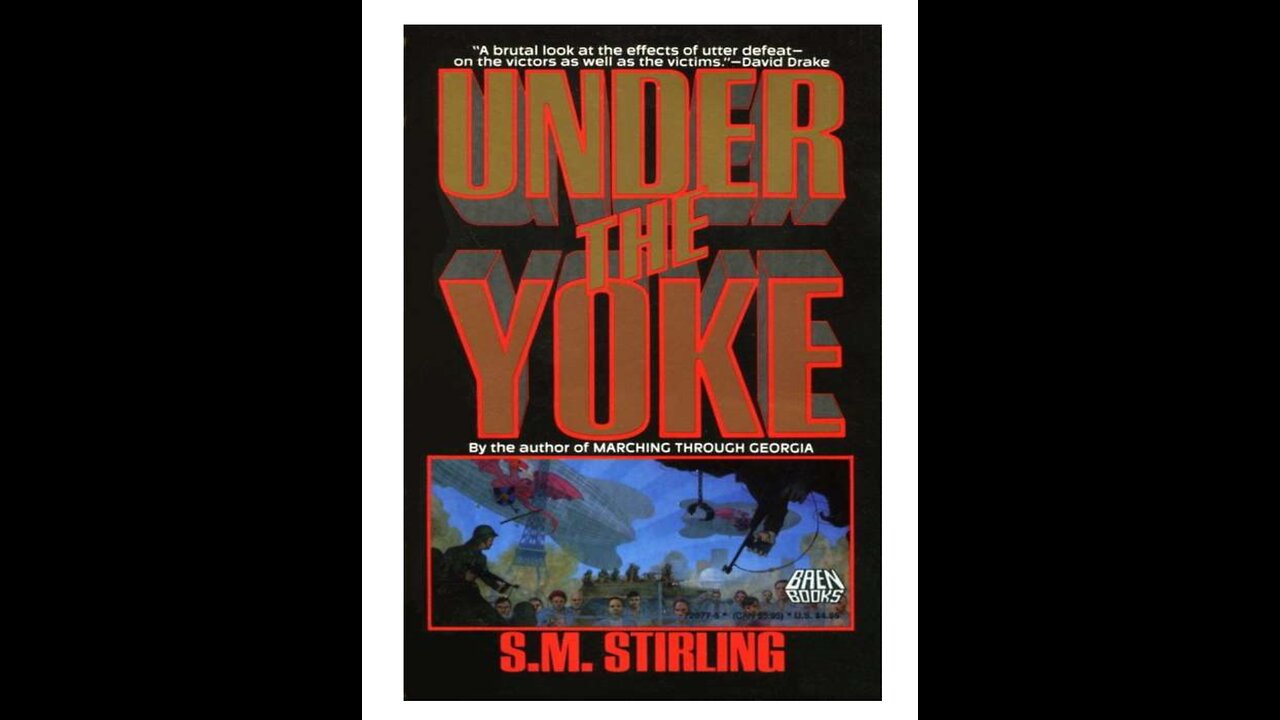
Under The Yoke by SM Stirling. A Puke (TM) Audiobook
Scanned by Highroller.
Proofed by Aunti.
Made prettier by use of EBook Design Group Stylesheet.
Reformatted for machine speech PukeOnAPlate2023.
Under The Yoke by SM Stirling.
CHAPTER ONE.
Enlargement of our standard lines in domestic, supervisory and recreational Items for the intending settler in the new territories. Our Agency has had agents on hand for every auction of choice items; stock your kitchens and servants' quarters from the best hotels and restaurants of Europe. And while Settlement Directorate issue may do for field-hands and machine tenders, when it comes to the strawbosses, interpreters and drivers you will need for your plantation or enterprise, our breaking-and-training establishments are unmatched for price and quality. Why go to the expense of importing your serf cadre from the dregs of the Police Zone? And amusement? From the snowy blond of Sweden to the olive of Italy, the fruits of conquest are yours to pluck. From peasants to aristocrats, from the illiterate to the ballerinas and university students of Paris, wench or prettybuck, your fantasy is our reality. Whether your desire is sjambok-broken docility or a wild Finn you can tame yourself. Stevenson and de Verre has it! Chemo-conditioning and polygraph testing ensure unmatched reliability for our product, reared in and tailored to local languages and custom, from Seoul to Lisbon! Don't waste precious time and capital training your own, consult our brochures, and contact your local representative for further information.
Advertising flier of Stevenson and de Verre.
Labor Agents, included in:
Settler Information Kit Number three. Settlement Directorate, European Area, 1948 edition.
LYON, PROVINCE OF BURGUNDIA REGIONAL HQ.
SECURITY DIRECTORATE DETENTION CENTER Seventeen.
APRIL, 1947.
"Pater Noster, qui est in caelis."
"Shut up, slut-bitch!" The guard raked her hard-rubber truncheon along the bars in frustration, then stalked off down the corridor.
Sister Marya Sokolowska lowered her head and fought to recapture the Presence; a futile effort, it could not be forced. Enough, prayer is more than feelings, she chided herself, while habit droned the sonorous Latin words and told the beads of her rosary. The words were a discipline in themselves; faith was a matter of the intellectual will more than subjective sentiment. And the others relied on her: even Chantal Lefarge the communist over in the corner was joining in; it helped remind them they were human beings and not animals-with-numbers, that they were a community, linked one with the other.
Something easy to forget in the ten-by-twelve brick cube of cell 10-27, under the Domination of the Draka. Though she was the only Pole here, and the only religious.
Covertly, her eyes followed the guard as far as the grill-door would allow.
The building had not been designed as a prison; the Draka had taken it over when Lyons fell, back in forty five. Before then. A school, perhaps, or some sort of offices. Then the Security Directorate had come, and cordoned off as many square blocks of the city as need dictated; knocked doors and built walkways between buildings, surrounded the whole with razor-wire and machine-gun towers, put in bars and control-doors. It was a warren now, brick and concrete, burlap and straw ticking, the ever-present ammonia stink of disinfectant. Lights that were never dimmed, endless noise. The tramp-trampclank of chain gangs driven in lockstep to messhalls or to their work, maintaining and extending the prison-complex. Far-off shouts and screams, or someone in the cell across the corridor waking shrieking from a nightmare.
Mornings were worst: that was the hour for executions, in the courtyard below their cell. The metal grille blocked vision but not sound; they could hear the footsteps, sometimes pleading or whimpering, once or twice cracked voices attempting the Marseillaise, then the rapid chattering of automatic weapons and rounds thumping into the earth berm piled against their block's wall. The nun finished the prayer and came to her feet, putting solemnity aside and smiling at the others. Together they rolled the thin straw-stuffed pallets up against the walls, each folding her single cotton blanket on top and placing the cup and pan in the regulation positions. There was nothing else to do; it was forbidden to sleep or sit after the morning siren. Conversation was possible, if you were careful and very quiet, a matter of gesture and brief elliptical phrases, and it helped break the terrible sameness of each day.
Newcomers brought in fresh tidings from the world outside, and bits of gossip passed from hand to hand, on work details or at the mess hall, not as elaborate as she had expected, there were too many informers and turnover was too high. This was a holding and processing center, not a real prison; a place to sit and wait until they took you away. Terrible rumors about what lay beyond: factories, labor camps, bordellos, medical experiments such as the Germans had done during the Nazi years. But no real information. For herself, it was not so bad; she had much time to meditate, and the others to help, and what came after would be the will of God, Who would give her strength enough to meet it, if no more.
Marya crossed herself and moved a careful half-pace closer to the bars.
Good, the guard had gone around the corner. She was just a trusty, a prisoner like the rest of them, with no key to open cell doors. She could mark an individual or a whole cell down and inform the real guards, the Security bulls and retired Janissaries who ran Block D, Female Section. That could mean flogging or electroshock or sweatbox for all of them, you never knew. But the guard would be reluctant to do that; it was unwise to have more contact with the bulls than you had to. A prayer was not enough provocation; a real racket might be, because then she would be in danger of losing her position and being thrown back into a holding pen, which meant being quietly strangled one night. Seven to one was bad odds.
God forgive them all, Marya thought. For them too the Savior died. She herself would probably get nothing more than a whack across the kidneys with the rubber truncheon at mess call.
Not for the first time, she reflected that Central Detention was like being inside a machine. Not a particularly efficient one, more like an early steam engine that gasped and wheezed and leaked around its gaskets, shuddering with loose fittings and friction. But it used the Domination's cheapest fuel, human life, and it was simple and rugged and did its work with a minimum of attention; she had been here six months and rarely even saw the serf guards and clerks who did the routine management, much less one of the Citizencaste aristocracy of the Domination.
There was an iron chung-chung from the landing down at the south end of the corridor; the main door to Block D, two stories up the open stairwell. A sudden hush caught the cells along the narrow passageway, an absence of noise that had been too faint for conscious attention, then a rustle as the inmates sprang to stand by their bedrolls. The nun moved to her own and assumed the proper posture, feet together, head bowed, hands by sides. She could feel the sweat prickle out on her palms, wiped them hurriedly down the coarse cotton sack-dress that prisoners were issued. Suddenly the familiar roughness itched against her skin, and she forced her toes to stop their anxious writhing in the sisal-and-wood clogs.
A whimper. Therese; she had never been strong, or quite right in the head since they brought her and Chantal in. A slight girl, dark and too thin, who never spoke and slept badly. The nun had had medical training, but it was nothing physical; the abuse that had made the elder Lefarge sister strong with hate had broken something in Therese. Perhaps it could never be healed, and certainly not here. Eyes met across the cell, and someone coughed to cover the quick squeeze of the shoulder and whisper of comfort that was all they had to offer.
Pauvre petite, Marya thought; then with desperation: much too early for the bulls to be down looking for amusement. And they had never picked cell 10-27. Holy Mary, mother of God, please.
The guard pelted down the corridor and dropped to her knees by the stairs from the landing. Marya's bedroll was nearest the door; she could see boots descending the pierced-steel treads. Three sets, composition-soled leather with quick-release hooks rather than eyes for the lacings. Draka military issue, the forward pair black and the other two camouflage-mottled. Quickly, she flicked her eyes back to her toes. A Citizen! Could they have found out? Silently she willed the boots to pace by, on down the corridor. Not praying, because this could only mean bad trouble and the only words her heart could speak would be: somebody else, anyone but me.
Marya swallowed convulsively, thick saliva blocking her throat. Even Our Lord asked that the cup pass from him. But he had not wished it on anyone else. Nor would she.
The lock made its smooth metal sound of oiled steel and the cell door swung open. She could feel the breeze of it, smell leather and cloth, gun-oil and a man's cologne.
"Bow, you sluts!" the guard barked, hovering nervously in the corridor.
The eight inmates of cell 10-27 put palms to eyes and bent at the waist.
"Up, stand up." A man's voice, cool and amused, speaking French with a soft slurred accent. "Present, wenches."
Marya jerked erect and bent her head back to show the serf identity-code tattooed behind her left ear, one hand holding back the long ashblond hair that might have covered it.
The position gave her a good look at the three men. Their armed presence crowded the cell, even though there was room in plenty with the inmates braced to attention. Two were common soldiers, Janissaries from the Domination's subject-race legions with shaven skulls and serf-numbers on their own necks. Big men, young, thick heavy-muscled shoulders and necks and arms under their mottled uniforms. Both carried automatic rifles; ugly, squared-off things with folding stocks and snail-shaped drum magazines; there were heavy fighting-knives in their boots, stick-grenades clipped to their harness, long machete-like bushknives slung over their backs. Dark men, with blunt features and tight-curled hair and skins the color of old oiled wood;
Africans, from the heartlands of the continent where the Domination began.
Their people had been under the Yoke for generations, and the Draka favored them for such work; they looked at the women with indifferent contempt and casual desire.
The third was an officer, a Citizen. In the black tunic and trousers of garrison uniform, with a peaked cap folded and thrust through his shoulderstrap;
Marya understood just enough of the Domination's military insignia to know he was a Merarch, roughly a colonel. A tall man, leopard to the Janissaries' bull strength. Tanned aquiline features, pale gray eyes, brown hair streaked with a lighter color, a single gold hoop-earring. No more than thirty, with white scar-lines on his hands and face, one deep enough to leave a V in his left cheekbone. A machine-pistol rested in an elaborate holster along his thigh, but it was the weapon in his hand that drew her eye. A steel rod as thick as a man's thumb with a rubber-bound hilt, tapering along its meter length to the brass button on its tip; a cable ran from the hilt to the battery-casing at his belt. An electroprod.
The tip came towards her face. Sweat prickled out along her upper lip as she fought against the need to flinch. Marya knew what it could do; the 'prod was worse than a whip, as bad as the sweatbox. The Draka used it to control crowds; the threat was usually as effective as an automatic weapon, and less wasteful. Too many times and you could start having fits. Applied to the head it could cause convulsions, loss of memory, change you inside. She closed her eyes.
Metal touched her chin. Nothing. Not activated. She opened her eyes, and the Draka nodded with approval.
"Spirited," he said. "Sound off, wench."
"Marya seven-three-E-S-four-two-two, Master," she recited, fighting off a flush of hatred that left her knees weak, on the verge of trembling. She would not show it, not when it might be mistaken for fear.
The man in black flipped open a small leather-bound notebook with his left hand. "Ssssa; 34, literate, languages French, German, English, Polish."He raised an eyebrow. "Quite a scholar. Advanced accounting. Ah, category 3m73, religious cadre, that would account for it." The electroprod clicked against the crucifix and rosary that hung through the cloth tie of her sack-dress. Made from scraps of wood, silently at night beneath her blanket. "Nun?"
"I am a Sister of the Order of Saint Cyril, Master."
The Draka flicked the steel rod against her hip, hard enough to sting. "You were. Now you're 73ES422, wench." He read further, pursed a lip. "Suspicion of unauthorized education? Ah, that was six months ago;
Security must have been dithering whether to pop you off or send you to the Yanks with the Pope and the rest." He shook his head and made a tsk sound between his teeth. "Headhunters, typical."
Marya felt herself pale. "The. The Holy Father has been exiled?"
Two more cuts, harder this time. "Master," she added.
He turned without answering, scanning the others. "You," he pointed.
"Chantal nine-seven-E-F-five-seven-eight, Master." Marya could see the film of sweat on the other woman's face, and knew it was rage, not terror.
Calm, keep calm, she thought. Suicide is a mortal sin.
The Draka stepped over and looked her up and down, smiling slightly.
She had dark-Mediterranean good looks, long black hair and a heart-shaped face, a full-curved body under the coarse issue gown. "At ease," he said, and the inmates straightened and dropped their eyes again; the officer chuckled as he watched the dark woman glaring at his boots and consulted the notebook.
"Twenty years, literate, numerate, French and English. Ex-bookkeeper, member of the Communist Party." He caught the hem of her gown on the end of the electroprod and raised it to waist height, and murmured in his own tongue: "Not bad haunches, but these Latins run to fat young."
Marya understood him, with difficulty; the English her Order had taught her was the standard British form. The Domination's core territory in Africa below Capricorn had been settled by Loyalist refugees from the American Revolution, speakers of an archaic eighteenth-century southern dialect, and it had mutated heavily in the generations since. He paused, let the cloth fall, tapped the steel rod thoughtfully against one boot.
"Shuck down, wenches," he said after a moment.
There was a quick rustle of cloth as the inmates stripped; the prison gowns were simple cotton sacks with holes for arms and heads. Marya undid her belt, pulled the garment over her head, folded it atop her bedroll, slipped off the briefs that were the only undergarment and folded them in turn, stepped out of the clogs and stood in the inspection posture, hands linked behind the head and eyes forward. The dank chill of the place seemed suddenly greater, raising the gooseflesh on shoulders and thighs, making her wish she could hug herself and run her palms down her arms.
When she had been arrested, it was only chance that the secret school was not in session and the children gone. All unauthorized education was forbidden, under penalty of death; they would have penned her and the children together in the room and tossed in a grenade. Alone, she would have died there and then if any evidence had been found. Two of the mothers had been with her, and there was no room in the police van; the green-uniformed Security Directorate officer had drawn her pistol and shot them both through the head as they knelt, to save the trouble of calling in for a larger vehicle.
And inside Central Detention there had been no interrogation, no torture; only the cell and the endless monotony spiced by fear, until she realized that her gesture of defiance was not even worth investigating.
There had been a speech for her batch of new inmates. Very brief: "This is a bad place, serfs, but it can always be worse. We ask little from the living, only obedience; from the dead, nothing."
Beside her Therese was weeping silently, slow fat tears squeezing out from under closed lids and running down her face, dripping from her chin onto her breasts. Most of the others were expressionless, a few preening under the dispassionate gaze; the Draka nodded and turned to the guard.
"This one and that one," he said, flicking the prod toward Marya and Chantal. "Put the restraints on them."
Marya's stomach lurched as the guard's rough hands turned her around and pulled her arms behind her back. The ring-and-chain bonds clanked, fastening thumbs and wrists and elbows in a straining posture that (breed the shoulders back; you could walk in them if you were careful, but they were as effective as a hobble when it came to running. Not that there was anywhere to run; and anything at all might be waiting beyond the iron door. Cell 10-27 was a bad place; of cold and fear and a monotony that was worse than either, grinding down your mind and spirit. Now it seemed a haven. The one thing you could be certain of in the Domination was that there was always someplace worse.
The guard shoved the two women roughly toward the door of the cell.
Marya staggered, turned and bowed awkwardly.
"Master," she said. "Our things?"
"You won't be back, wench," the Draka said, stretching. The Janissaries chuckled; one reached out and grabbed the weeping Therese by the breast, pinching and twisting. She folded about the grip in a futile shrimp-curl of protection, mouth quivering as she sobbed.
"Yo" be needin' us'n, suh?" he said. "Mebbeso we-uns stay here fo' whaal?"
The officer laughed, and Marya could feel Chantal quivering behind her.
Therese was her younger sister; they had been swept up together for curfewviolation.
Distributing leaflets, probably, but they had been clean when the patrol caught them and might have gotten off with a light flogging if Chantal had not attacked the squadleader when he started to rape Therese. The nun forced herself between the other woman and the soldiers, pushing her back against the bars, hearing the quick panting breath of adrenaline-overload in her ear and a low guttural sound that was almost a growl. Madness to attack three armed men with hands bound, but a berserker does not count the odds.
Even worse madness if by some freak she could hurt one of their captors; that would mean impalement, a slow day's dying standing astride a sharpened stake rammed up the anus. And not just for her; the Draka believed in collective punishment, to give everyone a motive for restraining the wilder spirits. Innocents would die beside her.
The Draka laughed again, reaching out and playfully rapping the Janissary across the knuckles with the electroprod. "Na, no rough work with Security's property," he said. "Besides, I know you lads; once you had your pants down you wouldn't notice even if one of the others pulled the pin on a grenade and shoved it where the sun don't shine. Then think of the paperwork I'd have to do."
The dark soldier released the woman and saluted. His officer returned the gesture, then grinned and clapped him on the shoulder. "But no reason you shouldn't hit the Rest Center until we're due; consider yourselves off-duty until." He looked at his watch "Twenty-hundred hours. Report to the depot then. Off you go; I think I can handle the wild French wenches alone."
"Yaz, suh!" the serf soldiers chorused. Their clenched right fists snapped smartly to their chests before they wheeled and left.
It had been half a year since Marya last saw the main door of Block D; not since the night of her arrest, when she had been kicked through still bruised and dazed from the standard working-over with rubber hoses that all new inmates received. And she was nearly the oldest inhabitant; the others came and went, swept in off the streets for some offense too petty to merit an immediate bullet, processed through and vanishing to places unknown. A few found the courage to call farewell as they climbed the pierced-steel treads.
Behind them came Therese's voice, thin and reedy:
"Chantal, don't leave me, come back, please."
Then the welded panels clanged shut, and they were outside. A serf clerk at a desk-kiosk, a saffron-skinned slant-eyed woman in neat coveralls who bowed as she took the papers the Draka handed her.
More corridors, more cells; the electroprod tapped her on the shoulder, left, right, pointing to crossings. A harder jab to Chantal's lower back, just over the kidneys. She gasped, stumbled, would have turned her head to glare if the aching strain of the restraints had not prevented.
"Walk more humble, wench," the Draka said softly. "Through there, I think."
A men's section, hairy faces crowding close to the bars and glittering eyes, silent and intent, others who looked at her with pity, or away. The nun felt herself flushing under that hopeless hunger, forced herself not to shrink back towards the sound of the Draka's bootheels. Courtyards, and she began to shiver as a thin drizzle of cold rain fell slick on her skin. Cobblestones, a brief glimpse to a road outside as a convoy of steam-trucks chuffed in with a new load of detainees, ragged figures clutching bundles and children as the guards chivied them into ranks for processing. Overhead, huge and silent, a dirigible was passing, its lights disappearing northward.
Then they were in an office complex. Soft diffused lighting instead of the harsh naked bulbs, warmth, rain beating against sound windows of frosted glass. Incredulous, her feet felt carpet beneath, soft and deep; somewhere a teleprinter was chuttering, and the homey familiarity of the office-sound brought sudden inexplicable tears prickling under her lids. She was conscious of her nakedness again; not in shame or modesty, but as vulnerability. Most of those she saw were serfs as well, but they were neatly clad in pressed overalls and good shoes, clipboards and files in their hands as they strode purposefully down the aisles or sat at desks working, typing, filling the air with a clatter of abacuses and adding-machines. Their eyes flicked over her and away, and she could see herself in them: nude and wet and muddy-footed, rat-tails of wet hair clinging to her shoulders, arms locked behind her. Livestock, beneath contempt to these born-serf bureaucrats, the selected elite who occupied the management positions just below the Draka aristocracy.
"Hope these'un're house-broken," a voice said, and others chuckled. Her ears burned, and Chantal beside her stiffened and glared. The man behind them evoked more interest: deferential bows, and curiosity. Marya saw a few other Citizens, through the open doors of offices or walking in their bubbles of social space, crowds parting for them; but those men and women were in the olive-green of the Security Directorate, not War Directorate black. The freefolk grew more numerous as they climbed stairs and at the last an elevator to the upper level. There was no bustle here; empty corridor with wide-spaced doors, wood paneling replacing the institutional-bile paint of the lower levels.
Names and mysterious number-letter codes on brass plates: "Morrison: infl. 77A Relig. delation."
"Carruthers: alloc. IOF Labor." A larger door still, unmarked, at the end of a hallway.
"Through," the Draka said, tapping them again on the backs of their necks with the prod. Hesitantly, Marya stepped closer. The dark oak panel slid aside with a soft shusssh, and she stepped through, blinking with astonishment. She had been six months in prison; before that six years in war-crippled cities, on the roads of Europe, in refugee centers and tenements. For a moment she lost herslf in wonder.
The room was large, a lounge-office fifteen meters by twenty. Two walls were floor-to-ceiling tinted glass, a view over the tumbled rooftops of Lyon down to the choppy surface of the Rhone, iron-gray under a sky the color of a wet knife blade. The other walls were murals in the Draka style, hot tawny savannah and herds of zebra beneath a copper sun. A huge desk of some unfamiliar glossy-russet wood occupied one corner, with a sparse scattering of files, intercom, telephone, closed-circuit television monitor. The floor was covered in Isfahan carpets, the furniture soft chairs around a cluster of low brass tables on filigree stands, Arab work.
The remains of a light meal were scattered on one, meats and cheeses, fruit and bread, coffee warming over a spirit-lamp with little pots of sugar and cream.
Marya felt her nostrils flaring and mouth filling. The prison fodder was abundant and adequate; porridge laced with fish and soya meal, hardtack, raw vegetables. Bland, bland; after months of it, years on scrimping wartime rations, the smell of the good food was intolerable. She was used to austerity, would not have chosen a religious vocation if comfort were essential to her, but she could feel her skin drinking in the softness and warmth, eyes flooding with the color and brightness. To feel something besides harsh cloth and stone, to see something that pleased the eye and was not ugly and hurtful.
The Draka officer's hand rested on her shoulder, forcing her to her knees beside Chantal. Inwardly, she shook herself as she bowed her head and glanced upward through the lashes; a prisoner could not afford the luxury of distraction. Focus on the people, she thought. Study them. Know those with power. Knowledge was the only defense of the weak.
There were five others in the room. A man behind the desk; Security uniform, high rank. In his forties but athletic, short, with dark curly hair, blue eyes, tanned pug face and a cigarette in an ivory holder. In the lounger.
Marya blinked. The woman lolling there was the first Draka she had ever seen not in some type of uniform; she was wearing low tooled boots, loose burgundy trousers, a long blouse-shirt over a stomach that showed the seventh month of pregnancy. Somehow that seemed unnatural, shocking. Of course Draka had to be born like other folk, but. Tall, hawk-faced, hair a mixture of brown and gold that gave the effect of burnished bronze, one hand holding a cup. A massive thumb-ring, long fingers. And beside her a girl of perhaps ten years in a thick silk tunic, playing with a long needle-pointed knife.
The nun frowned, glanced covertly from one face to another. There were two servants, in dark elegant liveries; one knelt in a corner and played softly on a stringed instrument, the other was a middle-aged black woman standing by the child, probably a nurse. Forget them for a moment; there was something about the Draka. All the Citizens she had seen had a certain look, of course: hard sculpted faces, gymnast's physique, the studied grace that came of long training. Even the girl had none of the coltish awkwardness usual on the verge of adolescence; her hands moved the blade with relaxed precision, spinning it up and snapping it closed again around the hilt without looking down. But there was something more.
Ah, a family likeness. Pale eyes and long limbs and sharp-featured eaglenosed high-cheeked faces; the pregnant woman might be the sister of the officer who had fetched Marya from the cell. She licked her lips, waiting.
"Gudrun, yo' said you were old enough to carry a weapon; don't fiddle with it." The woman's voice. Soft, rather husky. The child pouted, flushed and pulled up the hem of her tunic to slide the blade into a sheath on her leg. The blush was very evident under pale freckled skin, copper hair; there were dark circles under her eyes.
The pregnant woman worked her fingers and spoke to the man behind the desk. "An' yes, Strategos Vashon, I've been known to do outlines for mural work; the Klimt workshops have a few in their standard offer book. Not takin' commissions right now, though, what with everythin'." She transfered her attention to the two prisoners.
"So, Andrew, these two are the best yo' could do?"
The voice stirred a memory, elusive; darkness and pain, dust and the hotmetal stink of engines. It slipped away as she tried to grasp at it.
The Draka who had brought the women from their cell snapped his fingers for coffee, sinking into one of the chairs with a grateful sigh and hooking the electroprod onto his belt. "More difficult than the manual workers, sister dear, yo' wanted them spirited and intelligent. Troublemakers, in other words. That, these are; healthy sound stock, as well."
The woman shifted, sighed, rested one hand on her belly and held out the other.
"The tag," she said, and her brother tossed a strip of metal; her hand picked it out of the air with a hard fast slap. "Yasmin." The girl in the corner laid down her mandolin and rose to take the key. "Take the restraints offn them."
Marya kept her head bent as the serf approached, knelt behind the two inmates. A crisp sound of linen and silk, a smell of scented soap, a soft hand on her arm.
"These-heah on way too tight." The girl's voice was harder to understand than the Draka's had been, the same soft drawl but a more extreme dialect. "It gowin hurt." Metal clicked. Thumbs first, then wrists, then the painful stretch of elbows drawn together behind the shoulderblades. The fetters had been a burning ache; agony lanced through muscles and tendons, throbbing as circulation returned. Then relief through the fading pain, almost as hard to bear; involuntary tears starred her lashes, breaking the light into rainbows that flickered like kaleidoscopes as she blinked, as her hands fell trembling to the rough surface of the carpet. She heard Chantal's hoarse grunt, and the metal of the restraints clanking as the serf-girl folded them. When the dark woman spoke it was in a whisper, barely audible and spoken downward into the rug so as not to carry.
"Be brave, mah sistahs. Tings bettah soon." Yasmin rose, laid the restraints on a table with a bow and returned to her instrument, strumming a faint wandering tune.
Endless moments passed, and Marya became aware of the Draka speaking among themselves.
"Nice pair of Danes, but I thought you still had that Jewish wench, what was her name." the woman was saying.
"Leja." The officer in black worked his shoulders into the cushions and sipped his coffee. "I do, but I'm out of Helsinki in the field, most of the time.
No company while I'm gone, too much work for one when I'm back. Besides, she's pregnant again."
"Why not have her fixed, for God's sake?"
Andrew sighed. "And spoil years of work? She just might not like that, you know; even gratitude has its limits. Why do you think I pulled her out of that Treblinka place when we overran it back in. yes, forty two. Don't roll your eyes, I'm not going to start another boring war story."
"You don't have to, I remember the pictures you sent. Fuckin' sick picking her out, too, she couldn't have weighed more than thirty kilos." A grimace.
"What happened to the rest of them, anyway?"
"Ask our good friend Strategos Vashon here."
The squat secret police officer looked up from his desk and leaned back in the swivel-chair, picking up a ball of hard indiarubber. "Nursed them back to health, every one we could," he said; the ball flexed under the rhythmic squeezing of his hand. "Most enthusiastic collaborators we've got, particularly in Germany."
Alfred nodded. "And Leja was well worth the trouble, to me; six months an' the bounciest wench yo' could want. Saw she had good bones from the start, an' spirit too." He grinned without opening his eyes, as if savoring a memory, a gaunt expression. "Gave her a knife and she went down a row of SS guards we had tied up, slittin' throats. The two I picked up in Copenhagen, Margrethe and Dagmar, they're just nice little bourgeois muffins, pathetically happy to be out of the ruck and terrified of goin' back."
"Why not Finns?"
Andrew snorted. "Almighty Thor, no! When I want to commit suicide, I'll do it decent, with a pistol." He opened his eyes and extended a finger at Chantal. "Those Finns're most-all like Leja, or her; hearts of fire.
Sieu, they call it. Place won't be safe for a decade. You can tell it by the eyes."
He waved his cup toward Chantal. "Speakin' of which, look at that one, sister dear. I didn't save her from a gas chamber. Sure yo' want her 'roundabout the place?"
The pregnant woman rested her elbows on the arms of the lounger, placed her palms together, tapped fingers, addressed the inmates.
"Look at me, wenches." Gray eyes, impassive. Appraising. "My name is Tanya von Shrakenberg," she said. "Yo' will address me as 'Mistress Tanya", we pronounce it 'Mistis.' This is my daughter Gudrun; you will call her 'Young Mistis Gudrun.' I have bought you out of Central Detention." A smile.
"It may interest you to know that your price was roughly the same as a record player's; the tort-bond I had to put up was considerable larger, because yo' two're classified as potential trouble-makers."
Her head went to one side. "This is a bad place." Freya's truth, and you've probably heard rumors "bout what might happen when you leave; most of them are true. Breaking rock and shoveling rubble in a chain-gang until you died, most likely. Or worse. You've been very lucky indeed; now you're going to be part of the familia rustica on the plantation my family is establishing west of here. Household serfs; interpreters, bookkeepers.
Possibly in positions of responsibility, eventually. Well fed and clothed, not punished unless you break my rules. Which are simple and plainly stated, by the way." She pointed at Chantal, turned the hand palm-up, crooked a finger.
"Come and kneel here by me, Chantal."
The Frenchwoman shuffled forward on hands and knees, wise enough in the Domination's etiquette not to rise without permission. Tanya cupped a hand beneath her chin, forcing the head up. 'I've read your dossier, wench.
You were picked up for curfew-breaking by an Order Police lochos; yo then tried to brain the monitor with a piece of pavin'-stone. Why?" A tighter squeeze. “The truth, Chantal, not what you think I want to hear."
"He." A pause. "He tried to rape my sister, she's a child, she's only fourteen, Mistis!" The last word was a hiss.
Tanya used her grip on the other's chin to wag her head back and forth.
"With the result that you were both raped, repeatedly, then beaten bloody and ended up here, rather than in the factory compound where your family was sent." Another pause. "Have you enjoyed it here? Has your sister? From the report, she's simple-minded now: 'post-traumatic shock syndrome.' How do you think she's goin' to do without you to look after her, here in Central Detention?"
Marya could see the hands clenched by Chantal's sides, quivering. The Draka's voice continued: "Have you learned anything from this, Chantal? Besides the fact that the Draka are not humanitarians, that is.
"Hearken to the voice of experience, wench. Where are we?"
"In, in prison, Mistress."
"Beyond that."
"France, Mistress."
The hand shook her head again. "Wrong. We are in the Province of Burgundia, under the Domination; I am at home, you are an immigrant, ignorant of the laws and customs of the land." A smile. "And a serf, who is new to being a serf. I am a serf-owner, born of seven generations of serfowners; consider who will have the advantage of knowing all the tricks, here.
"Now, here's what I'll do. I will buy your sister Therese, as well as you.
She will have a room, light work; nobody will hurt her, and I'll even tell the overseers that she's hands-off." Chantal jerked and made a muffled sound.
"Or, if you wish, I will have you sent back to her cell and pick someone else.
Your choice. Shall I send you back, or not? Now, wench."
A whisper. "No, Mistress."
"Louder. I can't hear you."
"No, Mistress, please."
Tanya chuckled and leaned closer. "Now, that's what you should have learned from the incident that brought you here: the difference between courage and recklessness. Not at all the same thing. Tell me, Chantal, do you know what in loco parentis means? Yes? Good; you will be in loco parentis for your sister. Only, for you a special rule will be made; when the parent sins, the child is punished. Understand?"
She removed the restraining hand, but Chantal did not move.
"Yes, Mistress," she said, in a quiet, conversational tone.
"Oh, ho, what a look," Tanya said, keeping her eyes locked with Chantal's.
"Andrew was right; a heart of fire, this one. Maybe we'll continue this conversation at greater length, someday." She brought up finger and thumb and flicked the other's nose. "Back."
Marya let her breath out in a long shudder, only then conscious of holding it, averting her eyes as the other woman crawled back and sank on her heels by the nun's side, panting as if from a sprint. The sight was disquieting; the nun felt a flush of shame rising from breasts to cheeks and bent her head, letting the pale curtain of her hair hide her face and silently cursing the milkpale skin her Slavic ancestors had left her. The war, the Soviet and Nazi occupations, the long flight westward before the Draka had been chaos, random death, hunger, sickness, running through the cold wet squalor of the refugee centers. Soldiers and police, prison and camps she understood; even the Draka occupation had been merely a harsher version.
This was not a matter of armies and bureaucracies, however brutal; it was a ritual of submission rawly personal, as much a matter of calm everyday routine to her new owners as eating a meal. Oh, I understand the psychology of it, she thought; hers had been a teaching Order, and a progressive one. It was still something out of the ancient world, come to impossible life around her.
Tanya turned to her daughter, stroking her hair. "You've been patient, darlin'; now tell me, what do yo' think of these two."
"Well." the child frowned and wrinkled her nose. "They seem sort of, well, uppish. Sort of. um, shouldn't you punish them, mother?"
Tanya laughed, and tousled the girl's hair. "Cudrun, sweetlin', school can teach any number of useful things. But handlin' serfs is like." She pursed her lips and tapped one thumb on her chin. "Like dancing; has to be passed on, one practitioner to the next. There's never a set answer, not on an individual scale. What did the Romans call their slaves?"
Cudrun's frown relaxed; that was much easier. "Instrumentum vocale, mother. The tool that speaks."
"A wise people. But always remember, the tool that speaks is also the tool that thinks, and believes. Watch." She turned her attention back to the two kneeling figures. Fascinated, Marya observed the change sweep over her face; less a matter of expression than of some indefinable shadow behind the eyes, warmth vanishing until frosted silver looked out at her human chattel.
"You, yo' were a nun, eh?"
"Yes, I am, Mistress."
"Were. Now, if 'n I told you to sweep the floor, would you do it?"
"Yes, Mistress."
"If I gave you Gudrun's knife an' told you to cut Chantal's throat, would you?" There was a silent pause. "The truth, wench: don't try lyin' to me."
Marya moistened her lips. "No, Mistress."
"Ah." The Draka smiled. "And if I told you to jump out the window?"
"No, Mistis." At the Draka's arched brows: "Suicide is a mortal sin."
The Draka woman laughed softly. "And if I told you that if you didn't, I'd kill Chantal here?"
Marya opened her mouth, hesitated, shook her head.
"More difficult, eh?" Tanya chuckled and nodded to her daughter.
"Remember this; there is always some order that won't be obeyed. Either don't give it, or be prepared to kill. Human bein's are like horses, born wild but with a capacity fo' domestication. These are old fo' breakin', so it'll be difficult."
She turned to the serf-girl with the mandolin.
"Yasmin," she continued, writing and tearing a leaf from a pocketnotebook.
"Here. There's a Stevenson and deVerre office on the ground level.
Take them down and see to them, there's a good wench. Light cuffs, clothin', tell them the basics. We'll come down when yo're finished."
Yasmin covered her instrument in a velvet case and pattered over to them, signalling them to rise. Tanya levered herself to her feet and approached also, stopping them for a moment with a lifted finger, paused.
"You two are mine now," she continued; neither of the women lifted their eyes from the carpet. "All your choices are gone, except one. Obedience, life.
Disobedience, death. That one we can never take from you." Another pause.
"But yo've already made it, no?" She shrugged. "I am your fate, then. Yo've decided to spend life under the Yoke; so remember, there's no point kickin' and buckin'. Be good serfs, an' my family will be good masters. Resist, and yo' suffer."
CHAPTER TWO.
To defeat an enemy, we must understand him. National myths, and their modem equivalent, propaganda, are perhaps inevitable, certainly useful, but they must not be allowed to blind us to objective reality. Take, for example, the belief, common even among some historians, that the Loyalist refugees who settled the then Crown Colony of Drakia in the seventeen eighties had a secret master plan of world conquest already set out. And that a hidden cabal of Draka aristocrats has been implementing it ever since. Nonsense: a transference to the past of present patterns, as ridiculous as a historical novel showing an 18th-century Englishwoman deliberately seeking a suntan. What is the reality? As usual, a process of cultural evolution that combined blind chance with conscious decisions, many of those falling victim to the Law of Unintended Consequences.
The leaders of the proto-Draka were migrants from the slave societies of the Caribbean and the American South; but their subjects were not the uprooted, demoralized fragments delivered by the slavers of the Middle Passage. Little is known of the pre-conquest cultures of Africa, the Draka shattered them too thoroughly, but the evidence suggests strong, militarily formidable peoples. Breaking them, and keeping them broken, produced an overwhelmingly warlike culture with a built-in bias towards expansion; the ideologues and philosophers. Carlyle. Gobineau. Nietzsche. Naldorssen. Merely produced an ideology for a society eager to cast off the increasingly alien ethos of liberal rationalism. The Orate aristocracy needed a world-view and belief system which would make them comfortable with what they were, and ordinary social evolution produced it. Such developments cannot be forced: they must spring organically from the human environment. The failed attempt in the eighteen nineties to revive Nordic paganism is an example, producing nothing but a new type of Draka profanity. But the belief system that did arise among the lords of the Domination then took on a life of its own, becoming cause as well as effect.
The Mind of the Draka: a Military-Cultural Analysis Monograph delivered by Commodore Aguilar Emaldo, US. Naval War College. Manila.
Eleventh Alliance Strategic Studies Conference Subic Bay.
DRAKA FORCES BASE NORDKAPPEN JUNE 12, 1947.
Oh-two hundred hours.
It was very quiet in the screen room of the electro-detection center, quiet, and dark. There was the underlying whir of the fans, click and hum of relays, a low murmur now and then from one of the operators or floor-officers. Most of the stations in the long bunker were switched off and under dust-covers, and the projac map on the north wall was dimmed. The air smelled of tobacco and green concrete and stale coffee and heating-duct, a tired night-watch odor.
The controllers bent over the faint green glow of their screens, faces corpsesallow in the cathode-tube light, insectile beneath headsets and eye-filters, motionless except for minute adjustments to the instruments; they were in Citizen Force undress uniform, black trousers and boots and dove-gray shortsleeved shirts.
Operator-first Dickson Milhouse leaned back and stretched, sighed and waved his cup in the air to attract the attention of the serf with the refreshment cart; the pedestal chair creaked as he yawned. Nightwatch sent you to sleep with sheer boredom, and when you came right down to it there was nothing very complicated about holding down a screen. Work for the Auxiliaries, really, except that it still had the cachet of high technology and novelty and so was reserved for Citizen personnel.
He rubbed his eyes. Nordkappen Base outside was just as boring. Morale Section tried hard, films and sports and amateur theatricals, and there was always the bordello, but there was just nothing to do here at the northern tip of what had once been Norway; they all had assault-rifles clipped to the top rails of the workstations, but that was merely War Zone regulations. There was still guerrilla activity in much of the territory overrun during the Eurasian War, Europe, Russia, eastern China, but here there was no native population at all, since the Lapps were run out. No game animals to speak of, not by African standards; the long summer days were a novelty that soon wore off, and as for winter. He shuddered. The winters here were nothing someone born under the peaks of Mt. Kenia could have believed.
Oh, well, you can always sit on a rock and watch the construction work, he thought sourly. This was an important base, watching the shortest greatcircle route connecting western Eurasia and North America, and tensions were already high between the Domination and the Yankee-run Alliance for Democracy. Dirigibles over the Pole, submarines under the ice, round the clock work here, everything from barracks and mess halls to industrial-size fuel cells and electrodetector towers; many of the installations were burn before reading secret.
His eyes fell back on the glowing green surface. He blinked, glanced away and back.
Equipment malfunction? No, too definite. Suddenly he was no longer tired, nor bored at all. His finger flicked a relay, and the amber light clicked on above his workstation.
"Let me see it." The floor-officer leaned over him, her fingers tapping the key-pad beside the screen. "Bring it up, two." A pause. "And again, two." Her thumb punched down on the red button. An alarm klaxon began to wail.
"Definitely a bogey," the floor-officer said.
Merarch Labushange grunted in reply, hitching at the uniform trousers that were all he had had time to don; sweat glistened in the tangled hair of his chest, amid several purple bite-marks. He was a short man for a Draka, uglyhandsome in the Mediterranean style, black curly hair, blue jowls, body the shape of a brick and thick arms and legs knotted with muscle.
"Estimate height and speed," he grunted, rubbing at red-rimmed eyes. The operator hid a smile behind a cough as he worked the calculator; the commander's new German wench was supposed to be costing him sleep.
The results clicking up drove camp gossip from his mind.
"Estimate. Estimate Mach 2.2 at 36,000 meters, Merarch."
There was a rustle from the other stations, a turning cut short by the floorofficer's glare. Silence, until the operator began another check of the console.
"Forget it," the Merarch said. "It's genuine."
"But sir, Mach 2?" the operator said, a cold feeling seeping up from his gut. The Domination had flown its first supersonic jet only a few months ago, and this was nearly half again as fast.
"The Fritz got manned rocket-planes to well over Mach 1, just before the end," the commander said absently, lost in thought. Of course, those had been one-off experiments, air-launched from bombers and not capable of more than a few minutes of powered flight, but. "The Yankees must have been workin' hard, produced a surprise. Afterwards they can claim it was a glitch in our equipment, or little green men from Mars." He grinned like a shark. "Trouble is, we have some surprises too, an' they can scarcely object to our usin' 'em, on somethin' that don't officially exist."
He glanced around the dim-lit room, and his smile widened. "Of course, it could be headed this way with an atomic." He strode briskly to the commander's dais, sank into the chair and keyed the communicator.
"Alert, codes Timbuktoo, Asmara, Zebra. Get me."
Echoing, thundering, the darkness of the B-30's cargo pod shook around Captain Fred Kustaa, toning through muscle and bone with subsonic disharmonies. He was strapped almost flat in the crash-couch, imprisoned in the pressure-suit and helmet, packed about with gel-filled bags to absorb the bruising punishment of the experimental craft's passage through the upper atmosphere. Outside the titanium-alloy skin would be glowing, the edges of the huge square ramjet intakes turning cherry-red as air compressed toward the density of steel.
It was the helpless feeling that was hardest to take, he decided, not the physical danger. He had been a combat soldier in the Pacific before he transferred to the OSS in forty-four, and God knew liaison work with the Draka in Europe in the last year of the War had been no picnic, but this.
Experimental, he thought. Everything's too fucking experimental for my taste. Donovan should have tried the submarines first. Hell, Murmansk wasn't more than a few weeks on foot through the forest to Finland, although it would be a bit difficult to carry the contents of the cargo pod on his back.
The aircraft lurched and banked, and his stomach surged again; he concentrated on dragging in another breath through the rubber-tasting facemask. Vomiting inside it would be highly unpleasant and possibly fatal.
About as maneuverable as a locomotive, had been the test-pilot's words; too little was known about airflow at these speeds. Kustaa did not understand the B-30, he would not have been risked over enemy territory if he did, but even just looking at it from the outside was enough to know it was leadingedge work. It didn't even look like an airplane, it looked like a flattened dart pasted on top of two rectangular boxes.
"Merde." The pilot's voice, Emile Chretien; Kustaa recognized the thick Quebec-French accent. He spoke a little of the patois himself, there were plenty of habitants scattered among the Finnish-Americans of his home in the Upper Peninsula. "Electrodetection, high-powered scanners."
Kustaa winced. Well, that had been one reason for this mission, to find out for sure just how good the Domination's new Northern Lights Chain was. The dark pressed against his eyes, and he used it to paint maps; their course from the Greenland base, over the Arctic toward darkened Europe. His imagination refused to stop, and he saw more; saw the alert going out below, to bases in Sweden and Norway, alarm-klaxons ringing out over concrete and barracks, flight-suited pilots scrambling to their stations. The blue flare of jets lighting the predawn as the stubby delta shapes of the Draka Sharkclass fighters rolled onto the launch paths.
The B-30 was supposed to be immune to interception; the Domination had the physical plant of the German ramjet research projects, but the U.S. had managed to smuggle out most of the actual scientists and the crucial liquidhydrogen results. The aircraft lurched again, shook as if the wings were going to peel away at the roots, stooped. One of the Pacific Aircraft researchers had said something about eventually flying right into outer space if they could lick the problem of combustion in a supersonic airstream; damned long-hairs had no sense of need-to-know, shouldn't have been talking like that in a canteen.
"Tabernac'! Another ray guidance beam, something's coming up after us!"
Of course, he reminded himself, the U.S. hadn't gotten all the German scientists; some had stayed, captives or those who had taken the Domination's offer of Citizen status for themselves and their immediate families. And the Draka army's Technical Section had good ideas too, sometimes; it was propaganda that they stole all their inventions.
"Positive detection. fille d' un putain, three of them; not manned, not at those speeds. They're closing on us, they must be riding the beam. Hold on, Captain, I'm dropping chaff and taking evasive action."
You mean this battering about wasn't evasive action? Kustaa thought plaintively.
This was as bad as going down the tunnels after the Nips, back on Sumatra in forty three, pushing the flamethrower ahead into the cramped mudsmelling blackness. Japanese, Captain, Japanese, he reminded himself. Part of the Alliance for Democracy now, they'd be associate signatories to the Rio Pact as soon as Halleck and the Army of Occupation got through restructuring. Couldn't call the little yellow bastards monkey-men anymore.
His mind skipped, nerves jumping in obedience to a fight-flight reflex that was pumping him full of adrenaline. And all I can do is sweat, he thought wryly. He could feel it trickling down his flanks, smell the rankness and taste salt on his upper lip. Think, he commanded himself. You're not an animal driven by instinct, think.
Unmanned antiaircraft missiles, a typical Draka brute-force solution.
Crude engines would be enough, if they were intended to burn out after a single use. The U.S., he corrected himself mentally, the Alliance, didn't have guidance systems small and rugged enough for a missile like that, although they would soon, so the Domination wouldn't either; they were years behind in electronics. But they could put the tracking and electro detection on the ground, just a passive receptor-steering system on the missile itself, that and a big simple two-stage drive and a warhead.
Christ have mercy, I hope it isn't an atomic, he thought. Probably not, they were still rare and mostly reserved for strategic use, but the Draka would be willing to explode one over a populated area. Populated by serfs, that is.
Jets and atomic bombs built by slaves, he thought. Insane. The Domination was madness come to earth; he shivered, remembering his liaison-work with the Draka army, during the misbegotten period of joint action against Hitler. Gray faces of the Belgian farmers as they prepared to drive their tractors out over the minefields. And the sick wet noises of the one who had refused, seated on an impaling-stake cut out of the little forest; his feet had scuffed around and around as he tried to rise off the rough wood sunk a foot deep into his gut, and blood and shit dribbled down the bark.
Some of the Draka dug in at the treeline had laughed, at him or at the explosions and screams in the plowed field ahead.
The B-30 went thump, absurdly like an autosteamer going over a bump at speed, and the sensation was repeated. That would be the strips of foil being ejected, hopefully to baffle the Draka electrodetectors. Acceleration slammed him down and to the side; they were climbing and banking, and metal groaned around him as the big aircraft was stressed to ten-tenths of its capacity.
"Still locked on. Merde, Coming up on target. Prepare for ejection.
Captain." The pilot's voice was full of a tense calm; Air Force tradition, cando, wild blue yonder.
His heart lurched, and his mind refused to believe the time had gone so fast, so fast; it was like the wait between boarding the landing-craft and the moment the ramp went down on the beach. Kustaa wished he could spit out the gummy saliva filling his mouth, as he had running waist-deep through the surf in a landing-zone. Some men did that, some were silent and some shrieked wordlessly, a few shouted the traditional gung-ho and a surprising number pissed their pants or shat themselves; you never saw that in the papers, but only a recruit was surprised at it.
Damn, start out a Gyrene and end up a paratrooper, he thought.
"Acknowledged." His circuit was locked open, had to be with his hands strapped down, but there was no point in distracting Emile.
"Ten seconds from. Mark." There was no point in bracing himself, the harness was as like a womb as the technicians could make it.
Nine, he counted to himself. He had married in forty one, right after the Nips had attacked Hawaii; they had planned to wait until he finished the engineering course, but being a Marine private was a high-risk occupation.
Aino had spent the war years in San Diego working in a shipyard. They had bought one of the new suburban ranch-style bungalows that started springing up around L.A. right after the Armistice.
Eight. The sweating dreams had been bad, waking screaming as the bunker door opened and the calcinated body of the Japanese soldier dropped out onto him, knocking him down in an obscene embrace with their faces an inch apart; Aino had held him and asked no questions, even when it woke little Maila.
Seven. She hadn't wanted him to continue with the OSS, especially not when it meant moving back East to New York; the capital was no place to raise a family. She had seen to the sale of the home where she had expected to live the rest of her life, doggedly settled into the Long Island brownstone, entertained his co-workers on awkward evenings when nobody could talk shop and long silences fell.
Six. They had been out to a movie, a Civil-War epic called President Douglas; the newsreel had been a political piece, film of a serf-auction in Archona. The usual sensational stuff lifted from the Domination's news services, no routine shots of black factory-hands here, ABS-Path way knew their audience found injustice more titillating spiced with sex and inflicted on white people. A showing of high-cost European concubines in heels and jewelry and nothing else, parading down an elevated walkway; the American film-editors had inserted black rectangles to keep the Catholic Decency League happy. The shabby refugee beside her had stood and begun screaming, pointing at the screen. "Mein Gott, Christina, Christina!" Still screaming, climbing over the seats with clawed hands outstretched towards the smiling blond image standing hand-on-hip. He was screaming as the attendants carried him away.
Five. Kustaa's wife had not objected to his volunteering for secret duty after that. He dreamed of the bunker less, now; but sometimes it was the refugee who stumbled through the steel-plate door in the nightmare, and the face was his own.
Four. It was not getting agents into Europe that was the trouble, it was moving them around, harder each month as more and more of the population vanished into pens and compounds. The Domination had leaned on its "allies" to reveal their Resistance contacts during the War, and had been politely refused. Some of the networks still survived, incredibly, but they were useful mostly for small stuff, escape-conduits and microfilm. Virtually impossible to move in equipment, except a few microscopic loads by submarine on wilderness coasts.
Three. His tongue touched the false tooth at the back of his mouth; melodrama, bad Hollywood, but he knew too much. It was lousy tradecraft, sending him in multiply tasked. There were too many contact-names and dates and codes in his head, but what was the alternative? Besides, they needed a survey, an overview of what was going on. If only they could get deep-cover agents into the Security Directorate! It was easy enough to slip in agents posing as Europeans or Chinese, it would be years before a billion individuals could be necked and registered, but every Citizen's identity was established from birth and there were only forty million of them.
Two. Of course, the Draka had probably slipped hundreds through with the vast flood of refugees that had poured across the English channel in the last days of the War, when the Domination's armies were driving for the Atlantic. More would come through with every boatload of escapees, probably many sleepers under deep cover, it was long-term planning and the Draka thought that way, but what could you do? One. He had seen his daughter take her first steps on his last leave; Aino had looked up, and as their eyes met,
Impact. Blackness.
A yell of satisfaction filled the electrodetection center of Nordkappen Base. The third missile's trajectory intersected the American aircraft's flightpath, and the sound rose to a howl; fell away to a disgusted mutter as it winked out and the blip of the intruder re-emerged. Merarch Labushange ground out another half-smoked cigarette; an attendant had brought his shirt and tunic, but the rims of his eyes were still a bloodshot red.
He rose in disgust, then checked.
"Wait a minute," he muttered. Then: "Cross-patch on that; increase resolution." He leaned forward to watch one screen, then another; swiveled to view a third that received its input from an automatic station in the mountains to the south.
"She's shedding something," he said quietly. "Increase resolution again, maximum. Look!" His finger stabbed out. Half a dozen traces were spreading out from the veering curve of the American aircraft. Smaller, much smaller, curving and falling.
"Is she breaking up?" the floor officer said hopefully, cradling her coffeecup.
Labushange shook his head. "At that speed? It'd be over by now. Lose aerodynamic stability at Mach 2 and you'd be metallic confetti; she's maintaining velocity. Increasin', if anything; and turning north."
His head turned to the nearest operator with a gun-turret precision. "Give me a ballistic trajectory on that debris, unguided."
The operator frowned, adjusting and calculating; his fingers danced over the controls while his eyes stayed fixed on the hooded green glow of the screen. "Faint, almost as if they were non-metallic. Hum, if'n they don't change direction after they drop below our detection horizon, central Finland, sir."
"So, so, oh, clever little Yankees; force us to show our best defenses, get back with the data, 'n drop good things to the worst troublespot in Europe."
Labushange closed his eyes and rose on the balls of his feet, biting his lower lip in thought. Then the orders came, spoken with a triphammer beat.
"Get me a teleprinter patch; East Baltic H Q, Riga. Route it though to Europe Command in Marseille, and to Castle Tarleton. Copies to Security liaison, all along. Then."
Kustaa was unconscious as the pod fell, the flexing snap of deceleration striking like a horse's hoof. It needed no guidance, a ton-weight egg of soft curves and dull, nonreflective coating that would make any but the most sophisticated electrodetector underestimate its size. Plummeting, tumbling, then turning to present its broadest end to the earth as wei
-
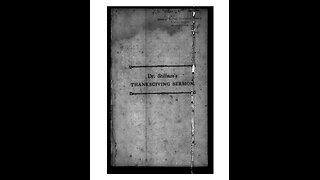 33:25
33:25
PukeOnABook
25 days agoThoughts on the French Revolution. Samuel Stillman 1794 A Puke(TM) Audiobook
49 -
 LIVE
LIVE
The Quartering
1 hour agoKash Patel "Discovers" Secret FBI Files On Trump, NYC Shooter New Conspiracy, Planned Parenthood
17,069 watching -
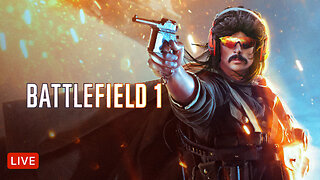 LIVE
LIVE
Dr Disrespect
3 hours ago🔴LIVE - DR DISRESPECT - BATTLEFIELD 1 - FULL GAME
1,657 watching -
 LIVE
LIVE
Crypto Power Hour
1 hour agoSmart Contracts On The Blockchain
251 watching -
 1:00:03
1:00:03
Russell Brand
3 hours agoRand Paul: Trump, Tariffs & The Tyranny of Centralized Power - SF623
112K84 -
 9:01
9:01
Dr. Nick Zyrowski
1 month agoThe BIG NAC ( N-Acetyl Cysteine) Mistake
2.26K5 -
 LIVE
LIVE
Tucker Carlson
3 hours agoJohn Mearsheimer: The Palestinian Genocide and How the West Has Been Deceived Into Supporting It
4,212 watching -
 39:30
39:30
The White House
2 hours agoPresident Trump Signs Congressional Bill, July 30, 2025
8.08K10 -
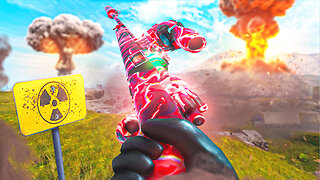 LIVE
LIVE
GritsGG
6 hours agoWin Streaking All Day! Most Wins 3215+!
42 watching -
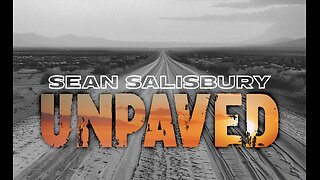 1:10:52
1:10:52
Sean Unpaved
2 hours agoGameplan & Glam: Sanders' Reps Snub, NFC North Heatwave, MLB Deadline Surge, Sweeney's Eagle Glow
13.2K